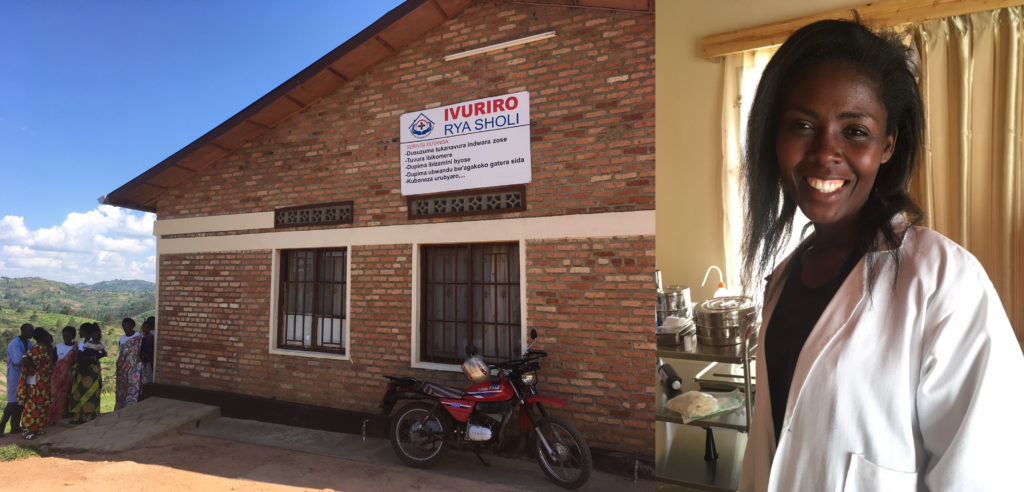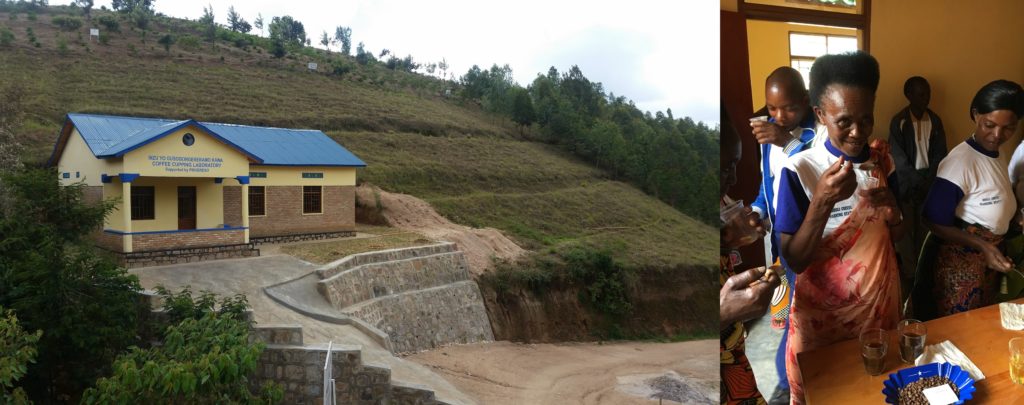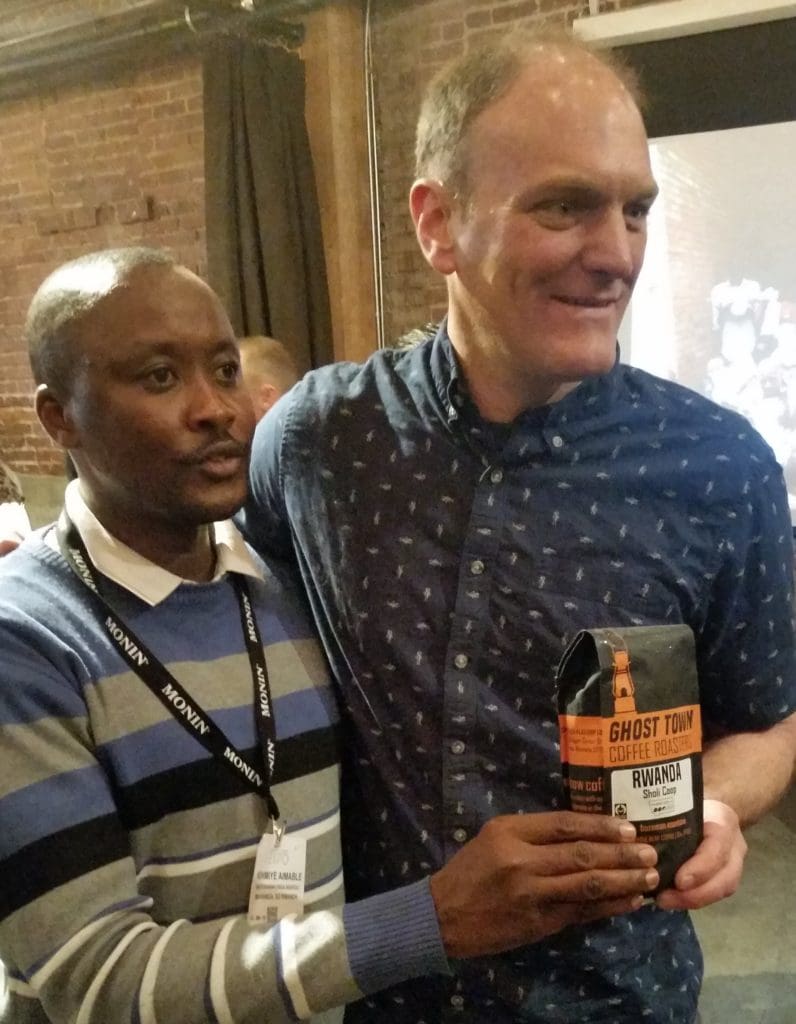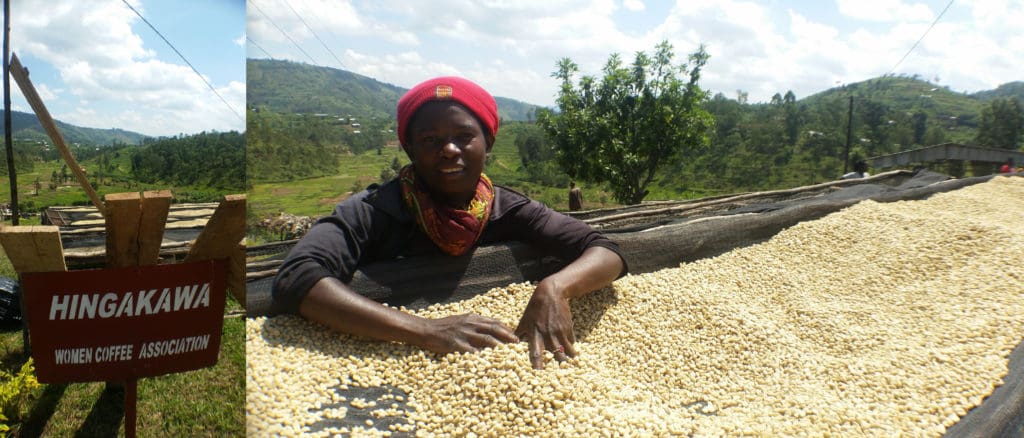During our visit with our partners at Abateraninkunga ba Sholi ("Sholi" translates to "mutual assistance") Cooperative, each interaction—from talking to the general manager, to members of the women’s association, to the women sorting parchment—served as living proof of what living and working cooperatively can look like. They even have an RFA sign on their premises that says something of the effect to "do good and be good", which felt like a kindred tie to Atlas’ mission to “be good and do good”!
Sholi is relatively remote—18 km/11 miles to the nearest medical clinic on poor roads—and lacks access to electricity and relies on a generator at the washing station (the quote to bring electricity to the washing station came in at a whopping 250,000,000 RWF/$287,000 USD!), so Sholi members are working on creative ways to address those challenges, such as looking into solar panels and contributing to a newly-constructed local health clinic that serves the needs of the entire community by offering basic first aid and medications for common ailments.
Sholi pays for the salaries of the five staff members as well as for some of the medications. Betty, the head nurse, is eager to affect change in the area, and is even trying to form some partnerships with other health clinics to share resources and training. Early childhood (under 5) malnutrition in the area is widespread and in the future, the clinic is hoping to offer a program to distribute a protein-rich flour blend of sorghum and maize, vegetable seeds for planting, and to offer cooking courses to teach parents how cook nutritious meals for their children.
In 2008, 30 women in the area were tired of traveling up to 18 km/11 miles away to sell their cherry and decided to pool resources and form a women’s association named “Kundwa”, meaning “love” in Kinyarwanda. In 2014, Sholi was borne out of this association, and of the 157 women who belong to Sholi, 70 are also members of Kundwa. To date, Kundwa has used their Fair Trade and quality-premium funds to start a micro-finance program, buy health insurance for its members, and pay for school fees for their children. They have their own coffee plot, and collectively own two cows. They sell baby calves for money and sell milk at the local market, and are trying to give each new member a goat (and once the goat has a kid, the first goat kid is given back to the cooperative). Jeanne D’arc Mugorewishyaka is the President of Sholi, and two of Sholi’s five board members are women. In sitting on the front porch of Sholi’s new cupping lab and offices with many of the Kundwa members and listening to Joan talk about Kundwa and Sholi, it was apparent she was an effective and kind leader, really wanting to improve livelihoods in the area through producing excellent coffee.
Sholi’s main Washing station is spotless, and not a cherry is wasted. Sholi sorts their coffee into four quality-grade leves: A1, A2, A3, and A4, which is sold locally. The coffee is depulped, then dry fermented between 12-18 hours (12 hours when hot, 18 when cooler), then washed and sorted into 4 grades. A4, is sold to local market without being soaked. Three higher grades--A1, A2, A3--are then soaked for an additional 24 hours before being sorted on drying tables. All of the cracked/defective beans that are sorted on the drying tables become A3 and are also sold locally.
Sholi’s waste-water treatment area is pristine, using a dozen sand and stone filters to clean the water from the washing station. They have also built a second Washing Station (“Buramba”), and this year they expect to produce around 8 containers of coffee in total (1/2 container women-procuded). They have also selected 120 members to start organic certification and are anticipating their final audit to be next year.
We visited Sholi’s newly constructed lab, which will be use for offices, roasting, cupping, and a small retail store. They plan on selling roasted coffee to farmers at a significantly discounted price to train on cupping and tasting coffee so they can experience the link between good agricultural practices and cup quality. Drew Billups, Atlas’ Lab and Education Director, Mollie Moisan of Twin, and I had a chance to cup several lots of Kundwa coffee ranging in score from 83.5 to 87.5 and to provide feedback about each coffee. We then invited the women to try their own coffee, with some enjoying it and others being surprised at the taste!
As Sholi is a relatively young cooperative, and our partnership with Sholi in the early stages, I’m personally honored that Atlas gets to work with such a delightful, driven, and generous cooperative, and look forward to a long and growing partnership with everyone at Sholi. As as we all know, but I’m continually reminded of, coffee is about more than solely the cup quality (not that Sholi’s quality is lacking!). The relationships that are formed and strengthened over time are a good reminder about how this unassuming ubiquitous beverage has the power to connect communities and people literally halfway around the world. In fact, earlier this year during our Producer Breakfast at the SCA Expo, we were able to connect Chad Kimm, owner of Ghost Town Coffee Roasters, the first U.S. buyer of Sholi’s coffee, with Aimable, Sholi’s affable manager.
In contrast to our newer partnership with Sholi, we’ve been working with Abakundakawa Cooperative for several years, and from 2015 onward we have purchased coffee specifically from the Hingakawa Women’s Association. While visiting Abakundakawa in early June, coffee processing at Rushashi, washing station was in full swing, with members busy depulping, washing, sorting at the “pre drying” tables, and carefully tending the drying tables. Abakundakawa received its Organic certification this year, the first cooperative in Rwanda to do so. With pesticides being subsidized and readily available, it’s historically been very difficult to obtain organic certification within Rwanda, but we’re seeing more cooperatives in the process of obtaining organic certification (a three-year process at minimum). We met with Hingakawa President Jacqueline Nyirandimubanzi to learn more about the Hingakawa’s communal plot, where they have plans to construct a training and education center later this year, with hopes in the futures of building a guest house for visitors. We look forward to staying at the guest house during a future visit! Atlas will be bringing in two containers of FT+O coffee from Hingakawa and we look forward to it year after year.
Sholi and Abakundawa serve as bookends on long-distance, long-term partnerships that Atlas cultivates – Sholi representing an new relationship, and Hingakawa an established but growing relationship. Atlas will be bringing in a container of FT RFA Sholi coffee this year (with approximately half of it being from Kundwa) and two containers of FTO Abakundakawa Hingakawa, and we hope you’ll give it a try!





